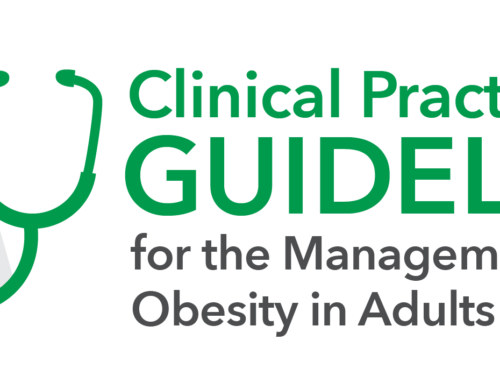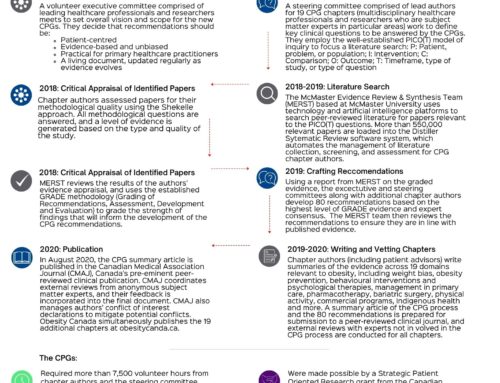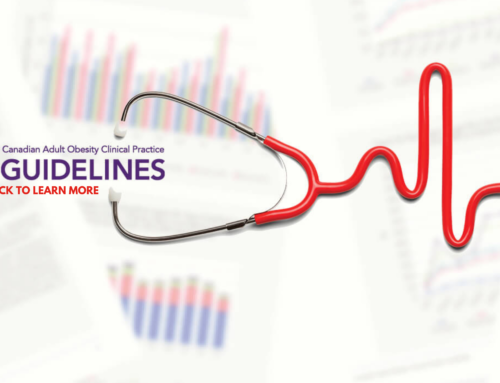Today’s post comes from Ian Patton, PhD. Ian is the Director of Advocacy and Public Engagement at Obesity Canada.
Over the past few weeks there has been a ton of media attention and discussion about the release of the new Clinical Practice Guidelines For The Treatment of Obesity. This has been overwhelmingly positive attention, and has shown that change is in the air, people are open to learning about the facts of this disease. If there is one thing that people can take away from the more than 550 000 scientific articles reviewed for the development of these guidelines, it’s that there is no longer a debate, obesity is a disease. It is not just a risk factor, or a result of poor behaviors. It is not a matter of willpower or the result of personal failings.
We know this because of how our bodies have evolved and how they operate. Our bodies are designed to, and quite efficient at, defending weight loss. Biologically, weight loss is seen as an attack on survival and our bodies respond swiftly and powerfully. We know that weight regulation is driven by the brain, including a number of hormones that regulate hunger, feelings of fullness, cravings etc. We also know that adipose tissue is a complex endocrine organ that influences health, and like any tissue, can become dysfunctional. We know genetics plays a massive role in obesity as does our environment, psychology, and so much more. The guidelines redefine obesity more appropriately as a progressive, relapsing chronic disease where excess or abnormal fat (adipose) tissue impairs health. This is important. This definition clarifies that size alone does not equate to health. Body size and weight do not equal obesity. Under this definition we can appropriately distinguish between someone who has obesity and impaired health and someone who may just be living in a larger body. You could also have the opposite situation where someone who would be classified as “normal weight” based on BMI but still be appropriately diagnosed with obesity if they have excess or abnormal fat that impairs health (e.g. adiposity around organs).
We also know that addressing obesity as a chronic disease is one of the strongest tools we have at reducing and eliminating weight bias and discrimination. If everyone shifted their thinking about obesity to align with the science we now have, and treated it like the chronic disease it is, we would be treated with the dignity and respect afforded to everyone else. We would no longer be shamed and blamed, abused and bullied. We would be given the space to live our healthiest lives, controlling what we can, while also being given the support to manage the aspects of this disease outside of our control.
As a patient advocate, I cannot tell you how many people that I have interacted with who have been overcome with relief and a sense of freedom when we learn this information. When we realize that the reason we have struggled and our health has been impacted is not our fault. That the yo-yo dieting we have all done is not an indictment of our failures, but rather a natural biological function of this disease, a weight is lifted off our shoulders. When we realize that nature intended for a diversity in body shapes and sizes and that crude assessments like BMI were never meant to be used with individuals the way we do now, we can be empowered to push back on societal norms of thinness. Most importantly, we can begin to believe that we are worthy of all the rights and respect that any other individual is given, and we can demand better.
There is however, a group of people who fight this notion of obesity as a disease. We can call them obesity deniers. Rooted in the noble cause of fighting for body acceptance and eliminating weight bias, obesity deniers want us to forget about weight loss and focus on health and loving the skin we are in. From a distance, I can get on board with that – those are all things I want and I fight for. However, when you zoom in closer, I fear these groups are doing more harm for the cause than good. In their opinion, even the word obesity is stigmatizing. Now if you are looking at obesity as simply weight or body size – then sure I can see that. But when you are approaching obesity as the complex chronic disease that it is, this just simply isn’t the case. They also fight feverishly about the “medicalization of weight”. That is, any attempt to address obesity through treatment or management is an attack on fat people that perpetuates bias. Again, this comes down to the rudimentary understanding of obesity of weight=health. If they were listening to the science and understanding the distinction between obesity and body size, this would not be an issue.
Many who buy into the obesity denier narrative are attempting to stop individuals from seeking out the help they need to live their healthiest lives. They are trying to tell us what we should and shouldn’t do from a perch of privilege. Many of them have not lived with the chronic disease that I, and so many others have, yet they feel they have the right to tell us how we should manage our health, especially when the science is overwhelmingly NOT on their side. Obesity deniers in their attempt to fight weight bias, are directly disenfranchising many in the very population they claim to fight for. Counter-productive if you ask me. The efforts of obesity deniers directly contributes to the stigma associated with proven, evidence-based obesity treatments. By doing so, these groups influence when and how individuals living with obesity manage their disease. This stigma that they perpetuate causes healthcare avoidance, delayed management and the progression of the disease unnecessarily.
I was dying. I could feel the fat sucking the life out of me. If I simply tried to “love the skin I was in” and embrace my fat body, I would be dead. I was sick and needed to seek appropriate, evidence based treatment to survive. Suggesting that I do anything less is ignorant, and fighting to eliminate access to such care is unethical and biased in its own right. If I am being honest, the blatant disregard for the mounting piles of evidence diminishes the position of obesity deniers to the level of anti-vaxxers or flat-earthers……just plain silly, but dangerous.
I fight for fairness, equality, respect and dignity. I fight to end weight bias. I fight for access to care and treatment. What I do not do is ever tell someone how they should manage their health or what is best for them. I don’t know their situation, it is likely very different from mine, I have no place to say what is right for them. All we should do is share evidence-based information so that we can all make our own informed decisions. I wish obesity deniers would afford me that same courtesy.






